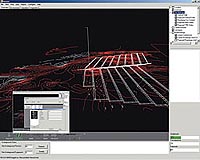 |
Orlando FL (SPX) Jun 15, 2009 A lunar eclipse helped a group of international scientists take a snapshot of earth's chemical fingerprint, which could help to identify planets most similar to earth where life may be thriving. University of Central Florida Associate Professor Eduardo Martin was a member of the team that made the observation, which is published in the June 11 edition of Nature magazine. The team used some of the world's largest optical and infrared telescopes located at the Roque de los Muchachos Observatory in La Palma (Canary Islands, Spain) to observe light reflected from the moon toward the earth during a lunar eclipse on Aug. 16, 2008. The eclipse provided team members with a unique opportunity to mimic what they could observe if they were watching the earth pass in front of the sun from an extraterrestrial observatory. When a planet passes in front of a star (sun), part of the starlight passes through the planet's atmosphere. That light contains the chemical composition of the planet and is called the transmission spectra of a planet. The chemical composition describes what makes up the earth and what makes it habitable to humans. Scientists expect planets similar to earth to bear a similar chemical composition. The snapshot the team took gives NASA and other space agencies a list of ingredients to look for when evaluating newly discovered planets. If a new planet has similar ingredients in the right proportion, then it would be a good target for further exploration. "Now we have a much better idea about what to do to find planets similar to our own where life may be thriving," Martin said. "The greatest reward will happen when one of those planets shows a spectrum like that of our earth." The team was led by Enric Palle of the Instituto de Astrofisica de Canarias. Other members, also from the same institution, include Maria Rosa Zapatero Osorio, Pilar Montanes-Rodriguez and Rafael Barrena. Martin has a Ph.D. from the University of Laguna in Spain, and he earned a Marie Curie Postdoctoral Fellowship in the Anton Pannekoek Institute at the University of Amsterdam in Holland. He also worked at the University of California at Berkeley, was a visiting scholar at Caltech and served as a professor at the University of Hawaii for several years. He is now a full research professor at the Centro de Astrobiologia in Madrid. He splits his time between Spain and Florida. Share This Article With Planet Earth
Related Links University of Central Florida Solar Science News at SpaceDaily
 Mine Safety System Goes Global
Mine Safety System Goes GlobalCanberra, Australia (SPX) May 26, 2009 A real-time risk management system to improve safety and boost productivity in underground mines will be available globally after a Queensland company was awarded a license to commercialise the CSIRO technology. Mackay-based company Mining Logic Solutions has signed an exclusive global licence agreement with CSIRO Exploration and Mining to commercially develop the Nexsys real-time risk man ... read more |
|
| The content herein, unless otherwise known to be public domain, are Copyright 1995-2009 - SpaceDaily. AFP and UPI Wire Stories are copyright Agence France-Presse and United Press International. ESA Portal Reports are copyright European Space Agency. All NASA sourced material is public domain. Additional copyrights may apply in whole or part to other bona fide parties. Advertising does not imply endorsement,agreement or approval of any opinions, statements or information provided by SpaceDaily on any Web page published or hosted by SpaceDaily. Privacy Statement |